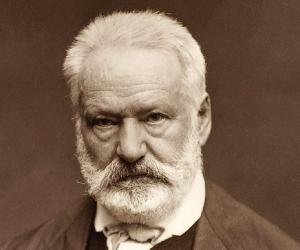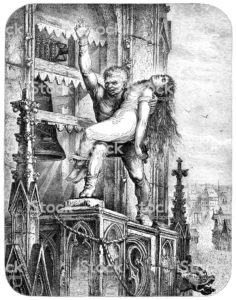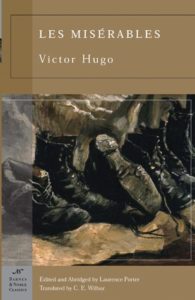Victor Marie Hugo (1802 – 1885) was one of the most popular French novelist, poet and dramatist of the Romantic movement. He is best known for his novels The Hunchback of Notre Dame and Les Misérables.
How is Les Misérables pronounced?
I speak little French and think you can pronounce French title Les Misérables as Lay Miserabla (pronounce the last a softly). Obviously, always good to hear it on youtube how its spoken.

Victor Hugo was born on 26 February 1802, in Besançon, France. He was the third child of Joseph Leopold Sigisbert Hugo and Sophie Trebuchet. Victor’s two elder brothers were Abel Joseph Hugo and Eugène Hugo.
Joseph Hugo was a Republican who believed in freethinking. He admired Napoleon and considered him a true hero. Sophie, on the other hand, was a Catholic Royalist. She is even believed to have had an affair with General Victor Lahorie, a French general and conspirator against Napoleon.
The different political allegiance soon created a rift between Hugo’s parents. It reflected the incompatibility of their marriage. It was also a time of political turmoil. His father was an officer in Napoleon’s army who held great power. However, Hugo came to adopt his mother’s Royalist opinion.
His mother looked after Hugo’s education and upbringing. It gave him an opportunity to avail studying at Pension Cordier and the Lycée Louis-le-Grand. He graduated from the law faculty in Paris. However, Hugo shortly started feeling that his studies had been purposeless and futile.
Hugo’s early poems and prose reflected his love for his mother and his admiration for her devotion towards her family. Nevertheless, after the Revolution of 1848, he started advocating for the ideas of Republicanism and freethought.
Marriage and Family
Hugo fell in love with his childhood friend Adele Foucher. But it was not approved by his mother. Hugo, therefore, waited until his mother’s death to finally marry Adele in 1822. Adele and Victor Hugo had four children – Leopoldine, Francoise-Victor, Charles and Adele.
Leopoldine, who was his eldest and most favourite daughter, died at a young age, shortly after her marriage. Hugo was devastated at the news of his daughter’s death. He composed many poems in her remembrance, and some biographers claim that he could never completely recover from it.
One of his most famous poems “Tomorrow, at Dawn” is said to have been composed about her, where Hugo describes his visit to his daughter’s grave.
Victor Hugo’s books and other works
Hugo had long realised he did not want to practice law. From 1816 onwards he was writing verses and translation – particularly of Virgil – two tragedies, a play and the elegies. His mother encouraged him in these works. Hugo founded a review, the Conservateur Littéraire, in which his own articles on Alphonse de Lamartine and André de Chénier were most appreciated.
In 1922, Hugo published his first book of poem titles, Odes et poésies diverses. The poems in this collection sympathised with the Royalist sentiments which earned him a pension from Louise XVIII. However, apart from the political ideas, his own taste for fantasy in also noticeable in these poems.
In 1823, he published his first novel titled, Han d’Islande translated as Hans of Iceland. It earned entrance into the Romantic group of poets. These devotees of Romanticism met regularly at the Bibliothèque de L’Arsenal.
His first mature and socially aware work is said to have come in 1829, The Last Day of a Condemned Man. It reflected the social awareness and conscience that would become more vivid in his later works. It had significant influence on writers like Albert Camus, Charles Dickens and Fyodor Dostoyevsky.
Hugo then concentrated in playwriting and became furthered the ideas of Romanticism through his play Cromwell (1827) and Hernani (1830). Hernani, according to some scholars declared the arrival of French Romanticism. It was a play that denounced neo-classical views and caused riots in the streets between romantics and traditionalists.
Hugo became more popular with plays like Marion Delorme, The King Amuses Himself and Ruy Blas.
The Hunchback of Notre-Dame and Les Miserables

Hugo’s novel The Hunchback of Notre-Dame was published in 1831. It is classified as a French Gothic novel. The story is centred in the Notre-Dame Cathedral. The novel drew attention towards the valuable architecture of the cathedral which was being replaced or changed by new buildings or new materials.
The story revolves around Esmeralda and Quasimodo, who was born with a hunchback who lived in the Notre-Dame Church under the guardianship of Archdeacon Frollo. it is the tragic story of Quasimodo and Esmeralda life and Quasimodo’s love for Esmeralda but essentially advocated for the medieval architectures of Paris which began to be seriously perceived by people henceforth.

Hugo published his most significant work Les Miserables in 1862. It was a monumental novel and required eighteen years. It concentrates on the history of France, the art and architecture of Paris, politics, philosophy, ideas of religion, monarchy, and justice. It also elaborates on ideas of romance and familial love. Les Miserables has been adapted into several films, television series and stage drama including musicals.
It became the most important work of Hugo’s life and became immensely popular among the masses. It, however, received some harsh criticism as well from people such as Gustave Flaubert, who could find “neither truth not greatness” in it. Baudelaire also complained about its ‘repulsiveness,’ though in private.
Victor Hugo’s Political life and Exile
Victor Hugo was ennobled and given a peerage by King Louise-Philippe in 1845. He also entered the Higher Chamber as a pair de France. There he spoke against the law of the death penalty and the various social injustices that he had witnessed. He also spoke in favour of the freedom of the press and the right of self-governance of Poland.
Hugo was elected to the National assembly in 1848, as a conservative. But he parted ways with the conservatives when he spoke about ending misery and poverty. He also advocated universal suffrage and free education of children.
Hugo was exiled for openly calling Napoleon III, who had gained complete power in 1851, a traitor. He moved to Brussels, and then Jersey. He finally settled in Saint Peter Port, Guernsey, with his family, where he stayed from October 1855 to 1870.
Hugo wrote and published his famous political pamphlets against Napoleon III while remaining in exile. The pamphlets were titled Napoléon le Petit and Histoire d’un crime. They were banned in France, but still made a huge impact among the public.
Victor Hugo’s Death

Hugo’s suffered several losses throughout his life. His wife Adele had died in 1868. His two sons died and his daughter Adele was admitted at an insane asylum. His mistress Juliette Drouet died in 1883.
All these personal blows, however, did not shake Hugo from his political commitments. In 1876, he was elected to the Senate. However, the last phase of his political career remained a failure.
Hugo suffered a mild stroke in 1878. He died of pneumonia on 22 May 1885. His death caused national mourning in France, Hugo was not only one of the most important literary figures of France, but also the one to shape the Third Republic and make a significant contribution towards the democracy in France.
Throughout his life, he remained an advocate of liberty, equality and fraternity. At the age of 75, in 1877, Hugo wrote, “I am not one of these sweet-tempered old men. I am still exasperated and violent. I shout and I feel indignant and I cry. Woe to anyone who harms France. I do declare I will die a fanatic Patriot.”
Victor Hugo Popular Quotes
- Life is the flower for which love is the honey.
- Nothing is more powerful than an idea whose time has come
- Music expresses that which cannot be said and on which it is impossible to be silent.
- Laughter is the sun that drives winter from the human face.